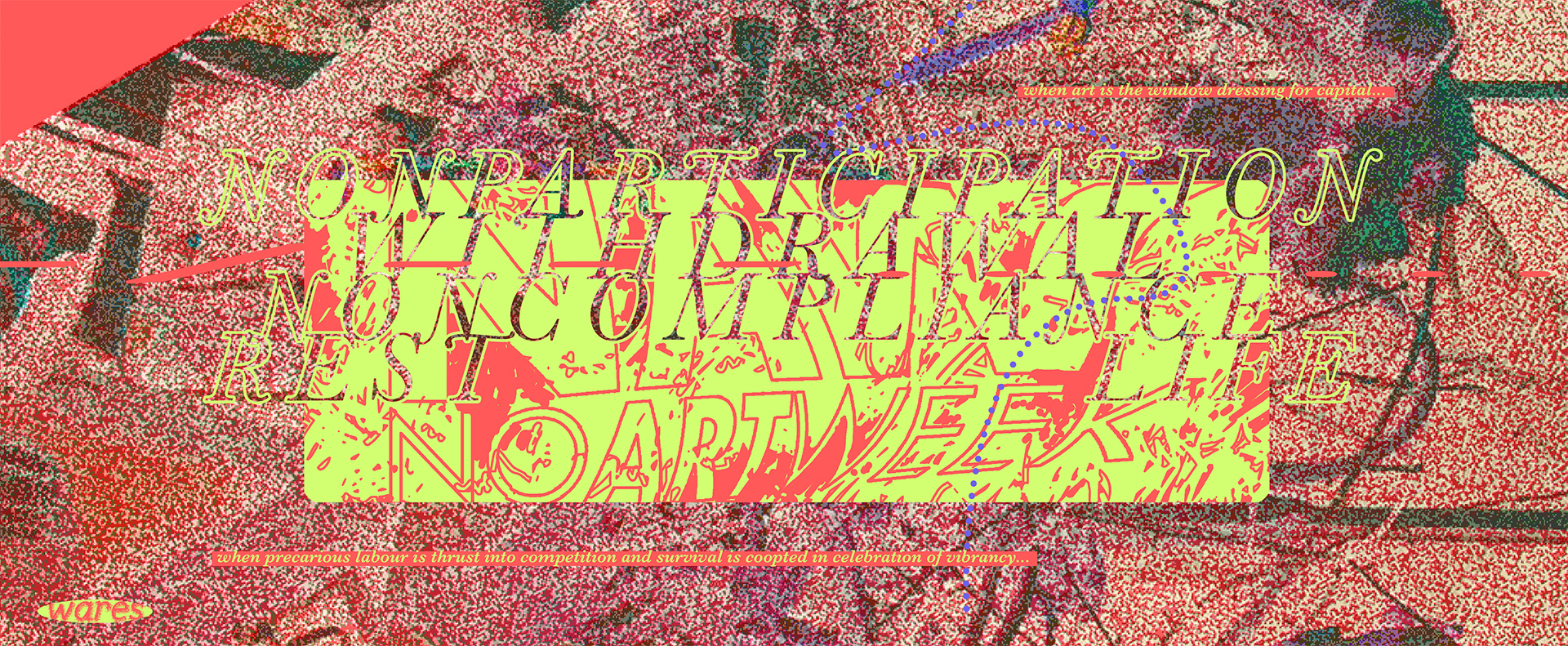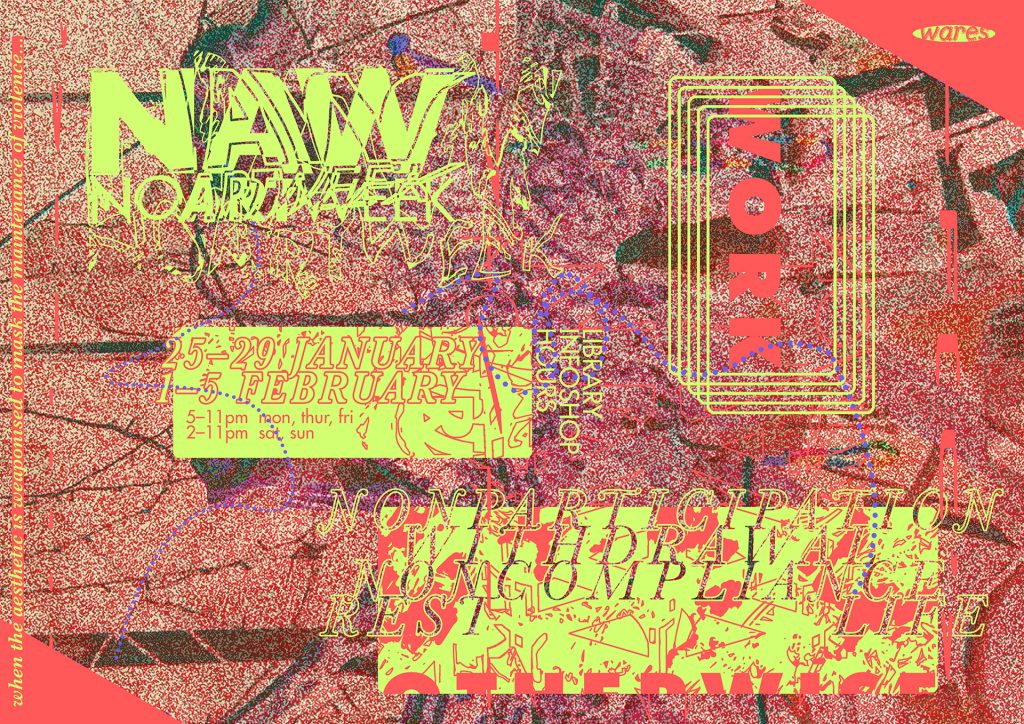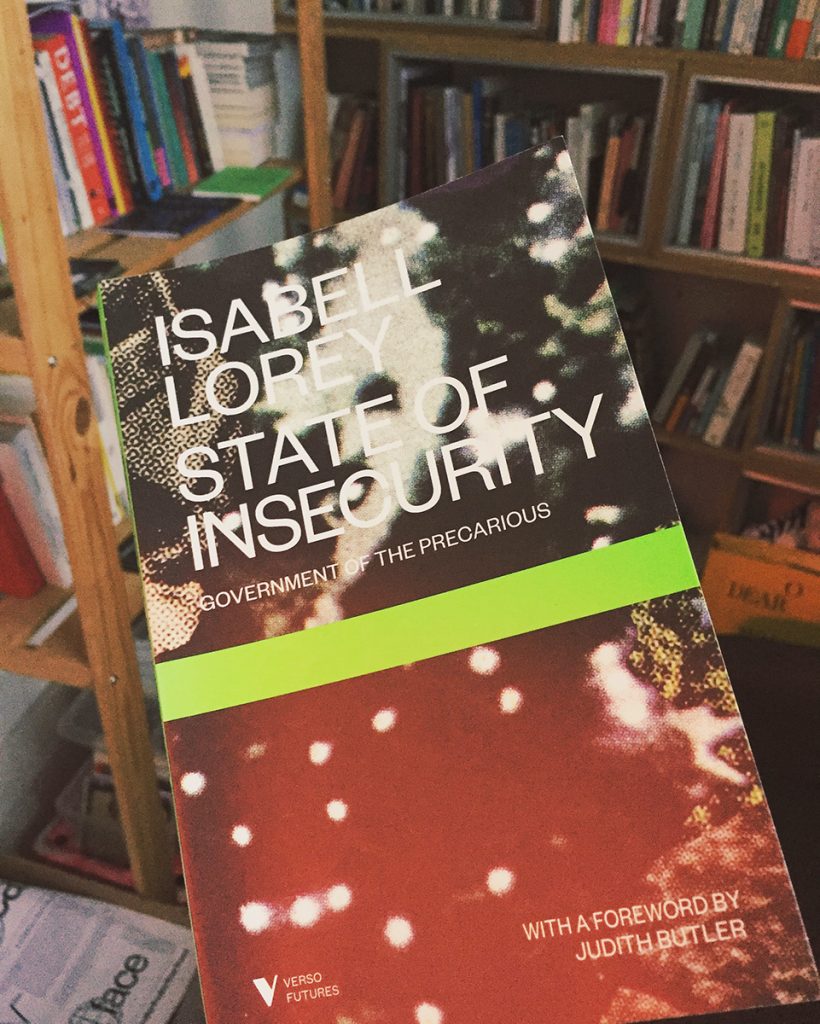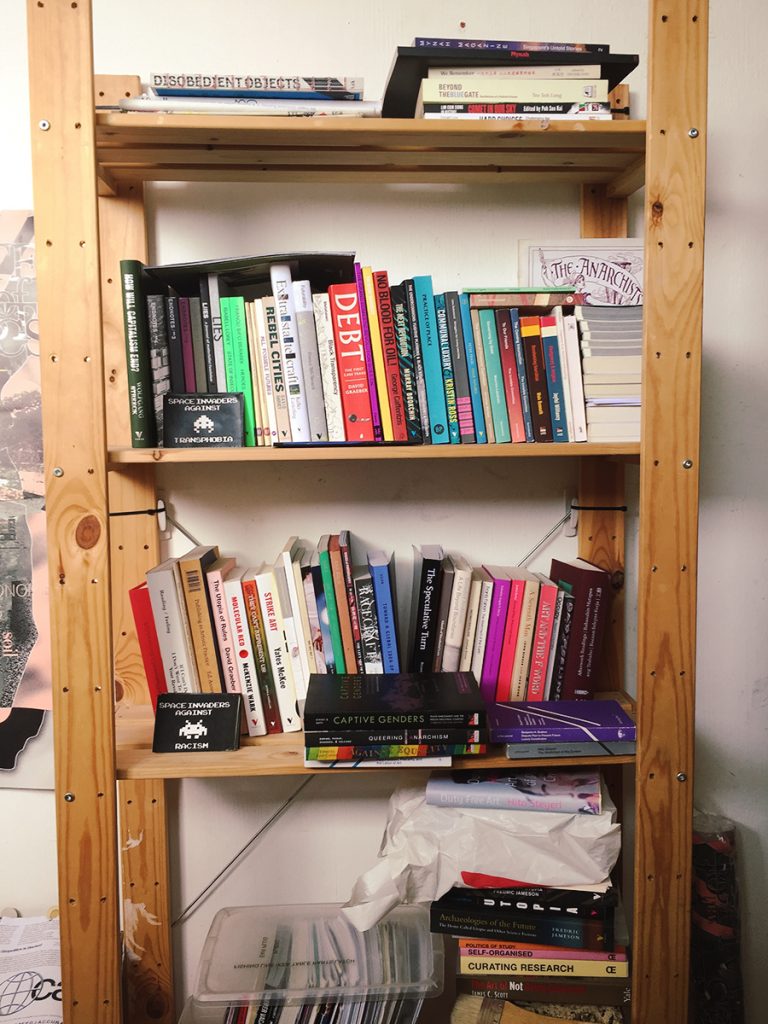
[Archived from original facebook event page on 26 December 2021]
24 January 2018
After a long hiatus, wares will be doing more this year, but it didn't feel right starting that off while so much else was scheduled to happen in January. For years the spectacle has been taking over. We decided to look into the cultural landscape of Singapore and the conditions that frame contemporary art today and try to understand it in a larger picture. Our response timed with Art Stage and the Singapore Art Week is rooted in withdrawal and cultivating refusal. Needless to say, this is not another thing to consume, but a holding open of space that could persist otherwise. We say NAW, we are over this, we're resting.

Event details: 25 January – 5 february 2018,
5 – 11pm on Monday, Thursday, Friday
2 – 10pm on Saturday and Sunday
#NAWartweek
We're tired. Tired of this assault, the bombardment of images and events; of endless things to see, things to consume; the need to show up and to be showing. Like us, you might have once believed in art as something beautiful, something that could move you, something that held promise for a utopia of freedom, but it has become ever clearer that this is not the case. Contemporary art (the most legitimated form that visual art takes today, but certainly other forms are well captured in this frame) is the window dressing for the crisis that is capitalism. It has been co-opted and also co-opts, wrapped up in the optics of business as usual. The festivalised lifestyle spectacle beckons to us that everything is well, while subsuming our lives to its construction of extractable vibrancy. As the Art Week (tied at its root to the art fair) spreads in scale, visibility and influence, these effects affect more than just the art worker, general encounters with art becoming inherently imbued with these inflections. The amount of human and non-human energies that go into maintaining this facade can only be characterised as waste. What are we working towards?
From a place of refuse, we are cultivating refusal. To not participate does not equal disappearance. To be noncompliant is not necessarily to reject all proposals. As precarious workers we know the crucial need to find and keep work. We know the social requirements of conviviality. Withdrawal happens on another level, something fugitive, tactical, and connective. It is the disavowal of competition, of the logics of the market, towards the growing of a culture of mutual aid and communality. It is the prefigurative rehearsal for a break. How can we support one another? How do we count more than the familiar as "one another"? If we are the wares, what does the tool do? What other structures of affinity can we build or maintain? This is refuge for those working to survive. We don't mean specifically this space of the library infoshop at soft/WALL/studs, even though we will hold it open on these dates, but the knowledge that we are not alone, that we too can assert autonomy, that there is something we can believe in, a hope for more that we can bring into form.
Don't come here for art (though part of Marcus Yee's installation is still in place). Don't expect to be seen (the guest list has been hidden). Don't seek an experience or mount a defence of the status quo (we're over that). But if you need a place that isn't home to dwell, to practise being with, to explore new thoughts, we are open.
In maintenance, we rest.
In resistance, we study.
For shared life.
This facebook event also marks the beginning of activities for wares in 2018. During this period of refusal, we will be reorganising the library, cleaning and maintaining our hosting space, making plans with friends, publishing texts, as well as sharing about our books and zines online. Opening hours for the library will not be followed to the dot – look out for updates to the contrary – and will serve as a test for regular hours down the line.
#SAW2018 #sgartweek #singaporeartweek2018 #singaporeartweek #undercommons
More about wares: [deprecated link]
31 January 2018
"Art strikes, boycotts, and occupations are examples of what Virno theorizes as exodus. In contrast to idle escapism, exodus is a productive act of contestation that unmakes structural ossifications in order to emancipate social energy. Exodus is an expression of constituent power, a form of collective potency fundamental for establishing new institutional forms. New institutions of the commons emerge beyond the tired opposition of the public sphere and the private sphere (a division based on the bourgeoisie concept of individual ownership). As a form of exodus, productive withdrawal aims to build such new common institutions. In the context of rising fascism, reinstituting the commons constitutes an institutional bulwark against micro-fascism and articulates new left politics."
"In the context of the art world, exodus represents less an escape from institutionality than suspension of its politically compromised forms: a performative attempt at rehearsing the constitution of new institutional frameworks, alternative to the ones linking corporate museums, large artistic events, and international art fairs. Such emergent assemblages might include both informal collectives and public institutions, who transform themselves in a process of transversal exchange and friction, creating new ways of practicing, thinking about, and sustaining art."
Productive Withdrawals: Art Strikes, Art Worlds, and Art as a Practice of Freedom, Kuba Szreder, in e-flux Journal #87, December 2017 [link]
4 February 2018

"Although precariousness designates both a condition of life and the foundation of the social and the political, it was not until life entered politics – with the biopolitics that developed in the late eighteenth and nineteenth centuries as analysed by Foucault – that governing began to centre in a previously unknown way on preserving the life of each and every individual in a population, so as to strengthen the state and serve the productivity of the capitalist economy. In the course of this new art of governing, governable biopolitical subjectivations emerged. In the eighteenth and nineteenth centuries, biopolitical subjectivations increasingly intertwined with ideas of liberal bourgeois freedom and democratic self-determination.
Governmental precarization thus means not only destabilization through employment, but also destabilization of the conduct of life and thus of bodies and modes of subjectivation. Understanding precarization as governmental makes it possible to problematize the complex interactions between an instrument of governing and the conditions of economic exploitation and modes of subjectivation, in their ambivalence between subjugation and self-empowerment. Practices of self-empowerment do not automatically have an emancipatory effect, but are instead to be understood in a governmental perspective as thoroughly ambivalent. They can signify modes of self-government that represent a conformist self-development, a conformist self-determination enabling extraordinary governmentally. Practices of empowerment, however, can also break through, refuse, or escape from appeals to functional self-government."
State of Insecurity: Government of the Precarious, Isabell Lorey. Verso Books, 2015.
5 February 2018

It's the last listed day of #NAWartweek [NAW~ refusal in a time of spectacularised productivity] at the library, we're open from now till 11pm tonight. Going forward, we'll be figuring out what kind of regular hours to adopt that can also flexibly complement the daily use and occasional activities at soft/WALL/studs. Let us know your preferences in relation to how time is ordered for you! It's been really encouraging and helpful hearing from some of you who have come through and dwelled with these books and the space, and it'd be great to be able to extend that availability into something recurring and stable, such that other possibilities could emerge from both content and container. We have plans for this year around collective reading, writing, and print – plans rooted in wares being about building autonomy and collective organisation. Cultivation of refusal, productive withdrawal and communality beyond is after all a drawn out process, and we want to maintain a consistency for its practice to materialise.